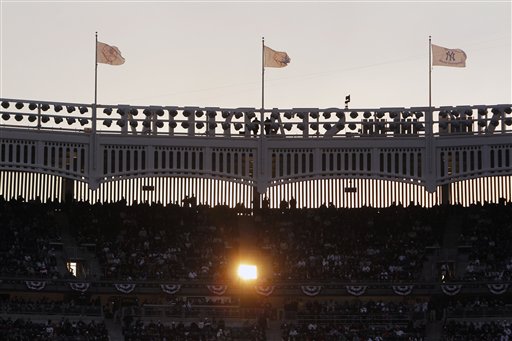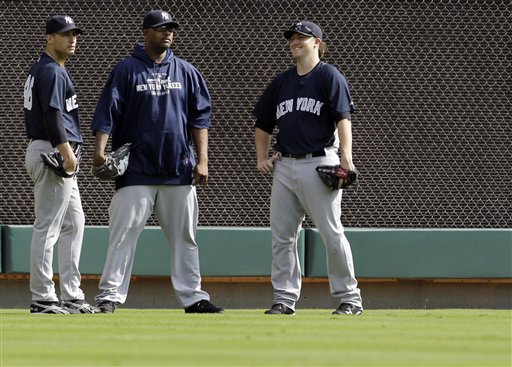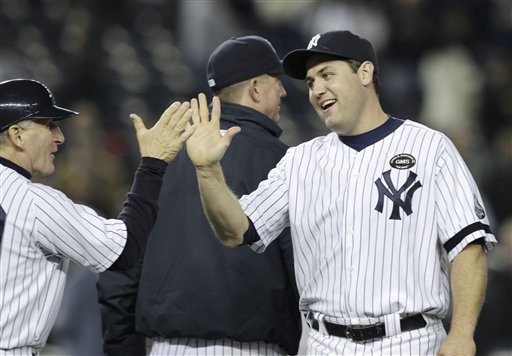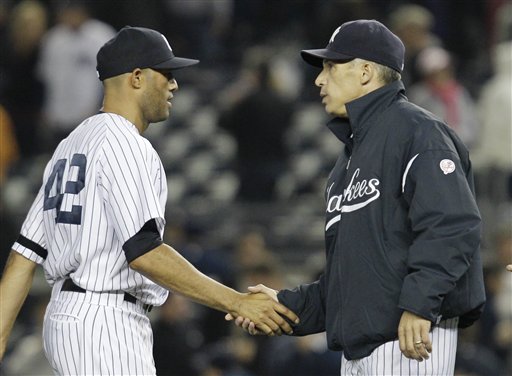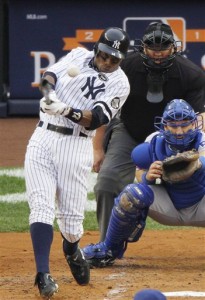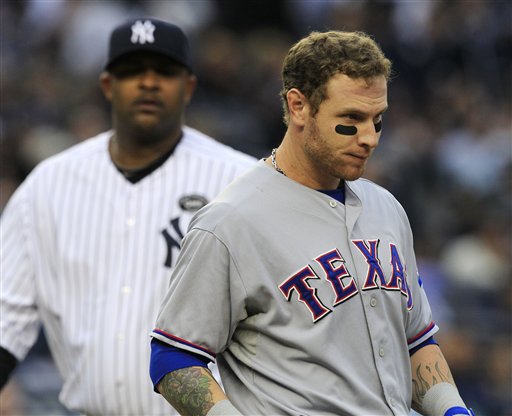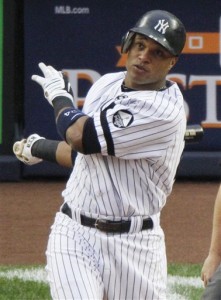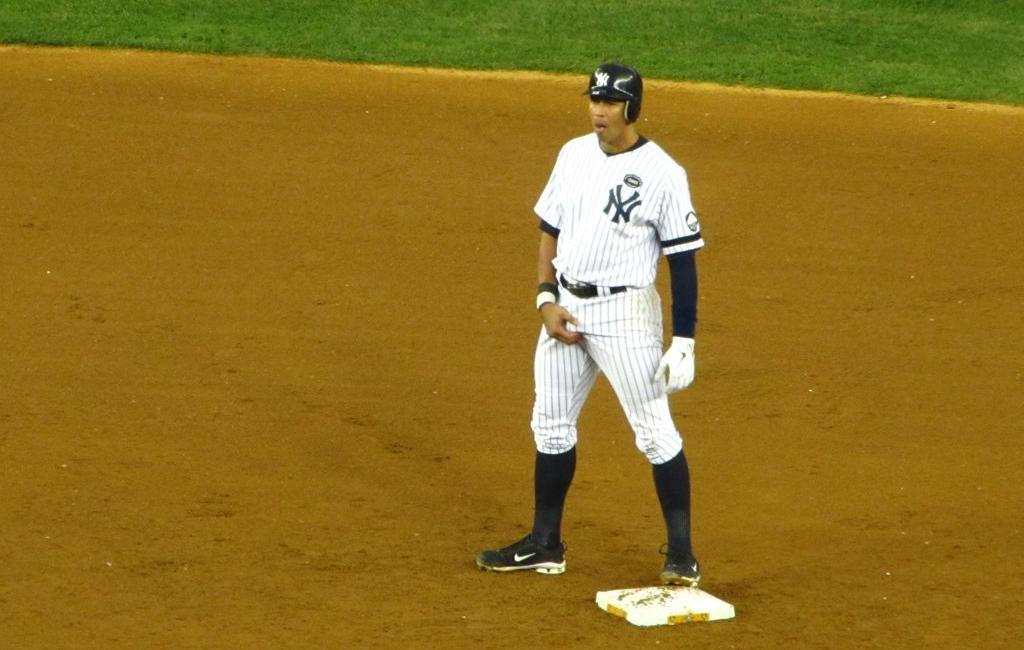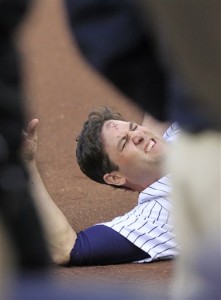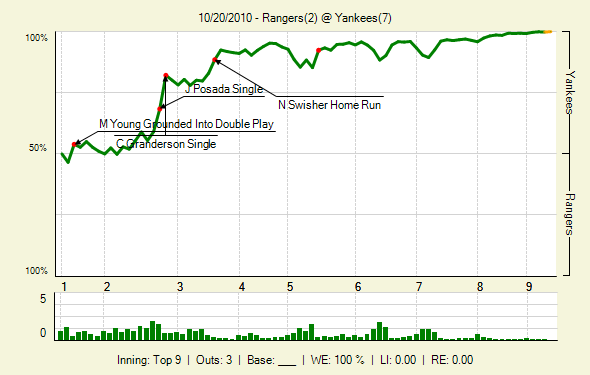it’s 3 a.m and thoughts of the League Championship Series are dancing through my head. After a magical ride in 2009, this year’s early exit after a 5-4 postseason sure is a downer. We didn’t offer up much in the way of a recap, and I wanted to offering some of my own musings on the series here.
For much of the end of 2010, Joe Girardi came under the microscope. He knew the Yanks were going to make the playoffs, and instead of pushing hard for the division — and home-field advantage — he rested his regulars and tried to get his banged-up team healthy for the playoffs.
By and large, it worked. Even though some of the crazed masses wanted the Yanks to take the meaningless AL East crown, the Wild Card Yankees swept through the ALDS and won Game 1 of the ALCS in dramatic fashion against the Texas Rangers. After that, it all fell apart. The Rangers simply outplayed the Yankees, and every move the team made backfired. So before we get to the real analysis, let’s get this second-guessing out of the way. What moves did Girardi make that raise some eyebrows and how much did they actually impact the team’s chances of winning the series?
Game 2: Phil Hughes gets the ball
The first decision of the series that involved some raised eyebrows came when the Yanks handed the ball to Phil Hughes instead of Andy Pettitte in Game 2. Based on the numbers — Hughes’ home/road splits and his short history of success in Texas — and the desire to have Pettitte go in a potential Game 7 instead of Hughes, it made some sense. Plus, the Yankees wanted to send their playoff best against Cliff Lee at home. Unfortunately, Hughes bombed. He gave up seven earned runs in 4+ innings, and the Yanks couldn’t overcome his ineffectiveness.
It’s easy to make the case for Pettitte here. He too has home/road splits that favor the road; he’s the team’s second best starter; and the club has to get to Game 7 before they start worrying about Game 7. The Yanks knew it would be tough beating Cliff Lee, and a 2-0 lead going home would have been far more comfortable than a split in Texas. Still, the team plated just a pair of runs in that game, and Pettitte would have needed to be perfect to win. I don’t hesitate to say that going with Hughes wasn’t a bad move, but I do wonder why Girardi left Hughes in long enough to give up seven runs in a pivotal playoff game.
Game 3: Turning the game over to lesser relievers
Even though it maybe shouldn’t have even happened, the Lee/Pettitte match-up lived up to its billing. Pettitte threw one bad pitch to Josh Hamilton, and Lee threw no bad pitches through eight innings of work. It all fell apart in the 9th, and it shouldn’t have. Kerry Wood, the Yanks’ set-up man pitched, the 8th, but then instead of going to Mariano Rivera to keep the game a bloop and a blast away from a tie, Joe Girardi went with Boone Logan and David Robertson. By the time Sergio Mitre came in to clean up the mess, it was 7-0 Texas.
Game 4: A.J. for too long
The Yankees had to start A.J. Burnett in Game 4 of the series. For good reasons, the club didn’t feel comfortable pushing Sabathia, Pettitte and Hughes on three days’ rest, and Burnett drew the short straw. For five innings, he was fine, but things got dicey in the sixth. Vladimir Guerrero singled, but a Nelson Cruz fielder’s choice led to the first out. Ian Kinsler flied out, and for the second time in the series, the Yanks walked David Murphy intentionally. With Joba up in the pen and Burnett nearing 100 pitches, Girardi left his starter in. Bengie Molina took the first pitch over the wall, and the life sputtered out of the Yanks. The bullpen couldn’t keep the game close, and the Yanks lost 10-3. Another close game had gotten out of hand because Girardi didn’t pull his starter soon enough and didn’t go to his ace relievers.
Game 6: Who’s in the pen?
Last night, we again saw Girardi push his starter to far and go to the wrong reliever. This time, the damage came in the bottom of the 5th. Hughes had flittered with disaster all night, and with two outs and a runner on third, the Yanks opted to intentionally walk Josh Hamilton to face Vladimir Guerrero. Vlad blasted a two-run double to center, and the Yanks handed the ball over to David Robertson who promptly gave up a two-run jack to Nelson Cruz. Eventually, the Yankees used Kerry Wood and Mariano Rivera, but they reportedly had CC Sabathia in the bullpen. Why do you go with your lesser arms in that situation? Is it even worth it to intentionally walk Hamilton to face Vlad?
The real problem: offense
Yet, despite all of these second-guesses, despite the way Girardi’s pitching moves made a bunch of close games seem like blowouts, the Yanks’ real problem was one of offense, and it isn’t fair to lay this on the feet of the club’s manager. The Yankees scored 19 runs in five games against the Rangers while giving up twice as many. As a team, they hit .201 and had an on-base percentage nearly .100 points lower than the Rangers did. They went 8 for 53 (.151) with runners in scoring position. They simply got outplayed, outpitched and outhit by a good Texas team that got hot at the right time.
In a way, the Mariners sealed the Yanks’ fate when, on July 9, they baked out of a trade that would have sent Cliff Lee to the Bronx. Lee instead went to the Rangers where he put a playoff-bound team over the top, and the Yanks had to contend with CC and Andy plus two guys who lost the ability to get outs and a youngster with a lively arm who had far surpassed his career high in innings pitched. They rode these guys all the way to Game 6 of the ALCS and deserve our appreciation.
By all accounts, Joe Girardi will be back in the Yanks’ dugout next year, and he should be. He’s managed this team to a World Series title and with a very successul regular season track record. He seemed to push all the wrong buttons this ALCS but should use it as a learning experience. What works in the regular season doesn’t quite work in the playoffs, and as the outs slip away, match-ups should take a back seat to urgency. He can’t, though, will the bats to hit, and the Yanks will just have to dust themselves off and do what 29 other teams have to do: Wait ’til next year.
